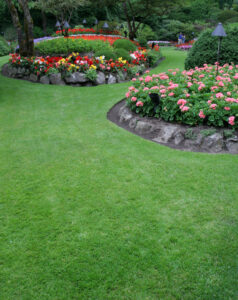
Every homeowner dreams of a lush, green lawn. But you may not want to use harmful or unnatural chemicals to achieve that perfect look. Don’t worry—there are organic methods you can use to maintain a healthy, green lawn. Here are 8 organic turf care tips we’ve gathered to help you care for your lawn the natural way.
1. Think Differently About Your Soil
Soil is a living organism, and just like us, it needs food, water, air, and a way to process waste. Organic fertilizers feed the soil’s microorganisms directly, helping to build a healthier and more vibrant lawn.
2. Test Your Soil Before Adding Nutrients
Before you start buying fertilizers, conduct a quick soil test to determine what nutrients your soil actually needs. We offer soil testing services at all our locations. Avoid guesswork—adding too much fertilizer can harm your lawn and the environment.
3. Use Compost
Compost is an easy, cost-effective way to feed your grass. You can create your own compost from kitchen and yard waste, or purchase it. It provides essential nutrients that support healthy growth in your lawn and garden—an essential part of any organic turf care routine.
4. Understand the Role of Weeds
Weeds might seem like a nuisance, but they can actually offer valuable clues about your soil. If your soil conditions remain poor, weeds will keep coming back. Instead of simply removing them, learn from them to improve your lawn’s health.
5. Not All Insects Are Pests
While some insects can damage plants, many are beneficial. Certain insects help pollinate plants, control pests, and improve soil health. Rather than using harsh insecticides, consider safer, more targeted options. Our trained staff can guide you on which insects to watch out for and recommend pet- and child-safe pesticides.
6. Mow Wisely
Proper mowing practices can significantly enhance the health of your lawn. Let grass clippings fall back onto the lawn as a natural fertilizer. Keep your lawnmower blades sharp to improve efficiency, and avoid cutting more than one-third of the grass height at a time. Also, don’t mow unless rain is forecasted in the near future.
7. Dealing with Bare Spots
Bare spots on your lawn can be frustrating, but with the right care, you can fix them. Store your grass seed in a cool, dry place, away from sunlight. When bare spots appear, spread the seed and cover it with a thin layer of compost, mulch hay, or seed aid. Keep the area moist until the seed germinates.
8. Manage Your Expectations
While it’s tempting to aim for a perfectly manicured lawn like you see on golf courses, it’s important to manage your expectations. As award-winning greenskeeper Jeff Carlson says, achieving a “weed-free, perfect lawn” may not be realistic for your backyard. However, you can still have a beautiful, green lawn grown organically with the right care.
Organic Lawn Care Products at Mendham Garden Center
We carry a number of organic lawn care products, including:
- Concern Weed Preventer and Fertilizer
- Espoma Lawn Food 15-0-5, which is rich in natural organics
- Espoma Weed Preventer 9-0-0 and Espoma Organic Lawn Food, both of which are safe for pets and children
- Milorganite fertilizer
Contact us today to learn more about how we can get your lawn looking green and healthy this year.
